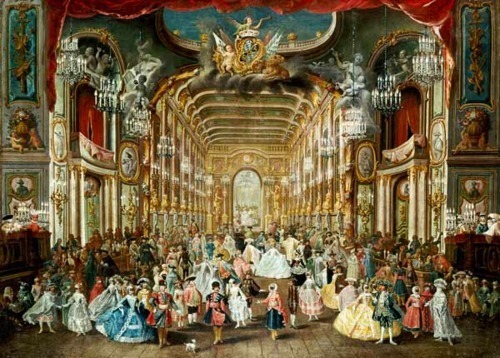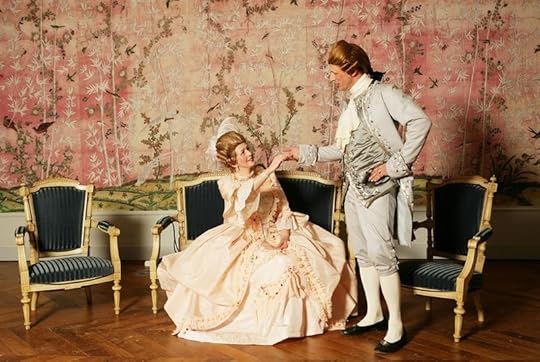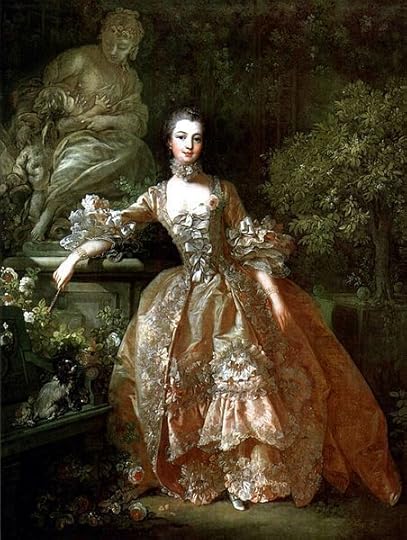What do you think?
Rate this book


352 pages, Paperback
First published January 1, 1926


"He is a pig-person. I hate him. I am glad that I bit him, and threw the coffee over him."Justin, the jaded Duke of Avon, is one of those mastermind type of characters I adore, weaving his revenge plot while everyone else around him tries to figure out what his intentions are and why he's doing what he is. And yet the suave Duke gets tripped up by this irreverent young girl he's taken in, who sees him clearly but adores him nevertheless. He acts languid and casual around others, but every once in a while you see his true determination and strength of character show through his posing. He's also snarky and sarcastic and has a dry sense of humor:
"M'sieur, you will think I come upon a strange errand, but I have a wife!" [De Faugenac] beamed at Avon, and nodded several times.The humorous dialogue, mixed with a suspenseful story of revenge and the cat and mouse game between the Duke of Avon and his enemy, the Comte Saint-Vire, was just a pleasure to read.
"I felicitate you, m'sieur," said Avon gravely.
"Yes, yes! A wife! It will explain all."
"It always does," answered his Grace. . . .
"She eats her heart out for your so lovely, your so enchanting, your so elegant--"
Avon held up his hand. "M'sieur, my policy has ever been to eschew married women."
"But -- but -- what do you mean, m'sieur? My wife pines for your page. . . She cannot sleep a night until she knows that he is hers."
"It seems that madame is destined to spend many sleepless nights," said Avon.
--Austin Dobson: Epilogue to Eighteenth Century VignettesAll the stars!
"If you desire to do good to la petite, send her to me"
"My dear father, I have never desired to do good to anyone"
 which was published in 1977.
which was published in 1977."Dear Edward has given Fanny a chocolate-coloured coach with pale blue cushions. The wheat is picked out in blue." He held the sheet at arm's length. "It seems strange, but no doubt Fanny is right. I have not been in England for such a time_Ah, I beg her pardon. You will be relieved to hear, my dear Hugh, that the wheat still grows as it ever did. The wheels are picked out in blue. Ballentor has fought..."

"Dear Edward has given Fanny a chocolate-coloured coach with pale blue cushions. The wheels are picked out in blue." He held the sheet at arm's length. "It seems strange, but no doubt Fanny is right. I have not been in England for such a time_Ah, I beg her pardon. You will be relieved to hear, my dear Hugh, that the wheat still grows as it ever did. Ballentor has fought another duel..."
 has the correct dialogue.
has the correct dialogue.The Duke fanned himself with an air, handling the chicken-skin like a woman.









”Where’s that pistol? Plague take this broth!” “He threw the bowl and the rest of its contents on the floor, settled his wig straight, and reached out a hand for the pistol”
"I thought you disliked melodrama, my friend?"
"I do; but I have a veritable passion for--justice."
"You've nourished thoughts of vengeance--for twenty years?"
The button of her foil came to rest below his left shoulder.
"Touche," said Avon. "That was rather better, infant."
Leonie danced in her excitement.
"Monseigneur, I have killed you! You are dead! You are dead!"
"You display an unseemly joy," he remarked. "I had no notion you were so bloodthirsty."

‘Oh, Monseigneur, I never thought that you would be so very blind!’ she said.
His Grace looked deep into her eyes, and then went down on one knee..
His Grace took snuff.
“Dear Edward has given Fanny a chocolate-coloured coach with pale blue cushions. The wheat is picked out in blue." He held the sheet at arm's length. "It seems strange, but no doubt Fanny is right. I have not been in England for such a time...Ah, I beg her pardon. You will be relieved to hear, my dear Hugh, that the wheat still grows as it ever did. The wheels are picked out in blue.”This was a reread on Audible of a book I’ve read so many times I know a lot of it by heart, even though it's probably been more than 2 decades since my last reading. The quote above, I remember, was when I read the book for the first time, my emotions went from enjoyment and anticipation to sheer delight. Although the incurably romantic and fun story still holds up, it suffers from the narration. Cornelius Garrett does not do well interpreting the suave, omniscient, and mordant Duke of Avon. Justin Alistair is an iconic character in the romance world, upon which many many subsequent romantic heroes by many other authors has been based over the years. I don’t think Mr. Garrett understood his character. He plays him in a voice that is too high-pitched and is sometimes bombastic and querulous. There is little nuance and little comic timing. In my own mind, I hear Avon’s voice as somewhat affected but not effeminate. I hear the unhurried dry quiet tones of the late great Alan Rickman. Cornelius Garrett is no Alan Rickman.